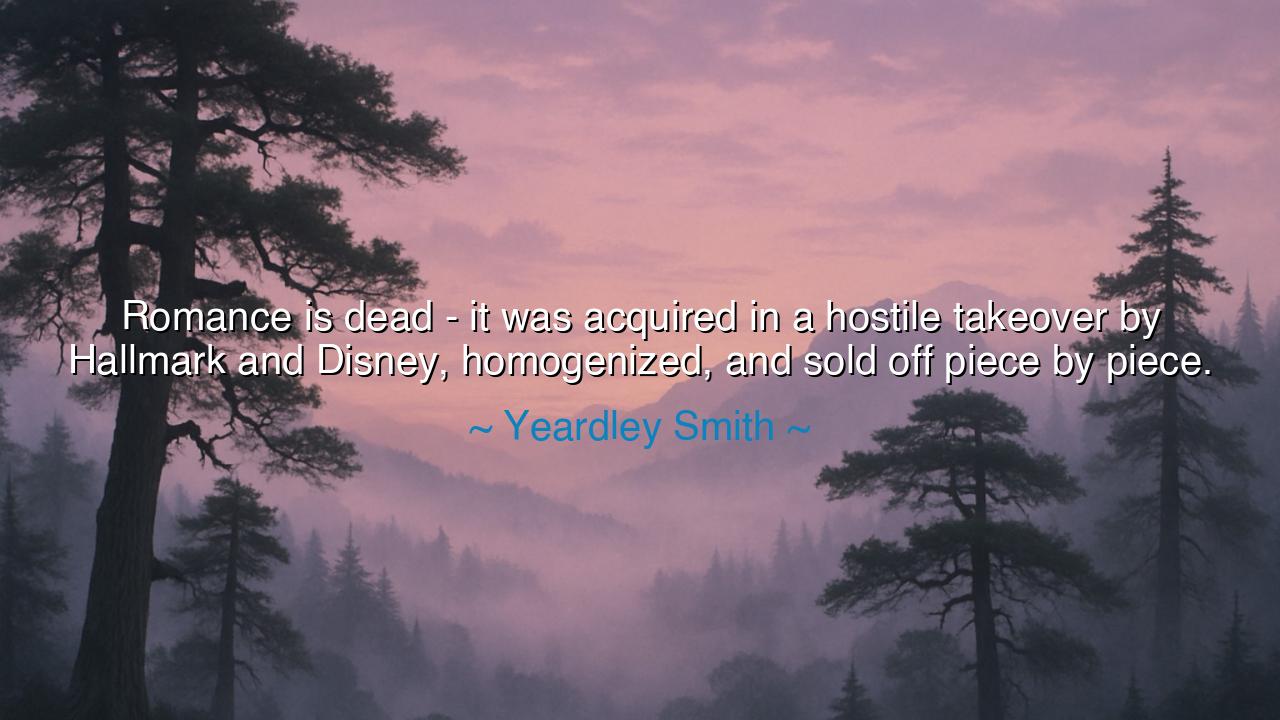
Romance is dead - it was acquired in a hostile takeover by
Romance is dead - it was acquired in a hostile takeover by Hallmark and Disney, homogenized, and sold off piece by piece.






The words of Yeardley Smith fall with the weight of irony and sorrow: “Romance is dead—it was acquired in a hostile takeover by Hallmark and Disney, homogenized, and sold off piece by piece.” In this sharp saying, she laments how the sacred fire of romance, once born of mystery, sacrifice, and authenticity, has been stolen by the forces of commerce and spectacle. What was once the trembling song of the heart has been packaged into greeting cards, formulaic films, and souvenirs, stripped of its wildness, and sold as product.
The ancients knew romance as something untamed, arising from the deepest parts of human longing. It was the love that inspired warriors to risk kingdoms, poets to pour out verses that bled from the soul, and saints to surrender themselves to the divine. Romance was dangerous and transformative, a force that could shatter ordinary life. But Smith’s words reveal how in our time, it has been bound, commodified, and drained of its danger. Instead of burning passion, we are offered ribbons, predictable plots, and scripted sentiment.
Consider the story of Tristan and Isolde, that old Celtic tale of love doomed by fate and fire. Their bond was not safe, not marketable, not wrapped in a bow. It was wild, it was forbidden, it was destructive and yet eternal. Had it been written by the pen of corporations, it would have ended in a cheerful marriage and a catchy tune. But the true story reminds us that romance is not always comfortable or tidy—it is the storm that reshapes lives. Smith’s lament arises from the fact that modern culture often erases this truth, preferring to sell a polished illusion.
Her reference to Hallmark and Disney is not accidental. These names represent the modern guardians of commercialized love: the card industry that reduces passion to rhymed clichés, and the studio that transforms romance into cheerful fairy tales with predictable endings. While such creations bring comfort and joy, Smith warns that they also risk dulling the raw and transformative essence of love. They replace the depth of human struggle with a homogenized sweetness, removing the shadows that give romance its power.
And yet, her words are not only critique but a call to remember. For if romance is dead in the hands of corporations, it can be revived in the hearts of individuals. Love must not be bought, nor borrowed from screen and store—it must be lived, risked, and created anew. The true romance is not the script handed down by commerce, but the unrepeatable story forged between two souls who dare to meet in authenticity.
The lesson is clear: guard love from the prisons of convention and consumerism. Do not allow greeting cards or films to dictate how you should feel, or what gestures should define your bond. Instead, craft your own symbols, write your own words, and risk your own acts of devotion. Let your romance be alive, not purchased; fierce, not predictable; authentic, not manufactured.
Therefore, let all who hear take action: turn away from the mass-produced definitions of love. Seek instead the trembling authenticity of your own heart. Walk beneath the stars with your beloved, write letters with your own hand, make sacrifices that cost you something real. For romance is not dead if we dare to breathe life into it once more.
Thus Yeardley Smith’s lament becomes a prophecy: romance may be buried under the weight of commerce, but it is not destroyed. It waits for those brave enough to resist homogenization, to strip away illusion, and to live love in its raw, enduring, and unrepeatable truth.






AAdministratorAdministrator
Welcome, honored guests. Please leave a comment, we will respond soon